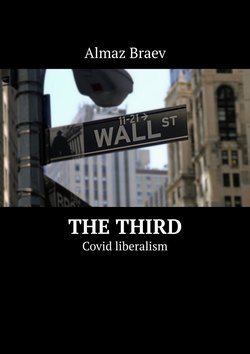Читать книгу The Third. Covid liberalism - Алмаз Браев - Страница 12
CHAPTER IX
ОглавлениеTHERE’S NO SUCH THING AS STATE!
When German zerefs and zeremids turned to their authority figures – evolutionary examples of how no one became someone: a doctor, a teacher, a lawyer – what were they told? Although in fact they never communicated, I will assume here, for the sake of discussion, that they did – and that the doctors, teachers, and lawyers did have something to tell those following in their footsteps. How did this German solidarity come about?
All those doctors, teachers, and lawyers (not to mention the small merchants and street vendors defined in Marxism) were the bourgeoisie (also defined in Marxism). Or the middle class, as we call it today. So who approached them, and why?
Recessions affect people regardless of their social class. But it is manual and office workers, peasants, and the poor who take the brunt. Bourgeois classes are different. As we can see, and as has been portrayed to us in the past, the uncontrollable greed of the upper bourgeoisie causes the market to overheat (as far as goods, capital, and speculation go). That adversely affects the market and market agents, and then the state itself. Mass layoffs result in unemployment. Needless to say, small profiteers stand as good a chance of going bankrupt as major factory owners. The state cannot help them (except maybe by giving out soup). Prices first soar so high public servants cannot afford to buy things they can’t do without; and then plummet as the market begins to lure buyers. Still, the public servants are essentially broke.
Times like these see everyone point their finger at the prime minister, not the largest exchange speculator. The prime minister is the one to blame! He has failed to prevent speculation. Ordinary people blame the recession on the government and, by extension, the state. Land-poor peasants and tenant farmers go bankrupt; they have to flock to cities, either because they don’t earn enough to pay the rent or because no one buys their produce. These zerefs, heirs of tradition, join the army of unemployed urban zeremids. The zeremids know for certain the blame lies with the state. But the rural zerefs go even further in searching for an answer to the question, «Who hung the government out to dry?» Those on your side could have never done such a thing. Only an enemy could. An enemy of the people and of the state.
To zerefs, all the harm comes from the enemy of the people, of the ethnos; to zeremids, the prime minister is the enemy. Doctors and teachers, however, have no enemies. With that said, they might have some. After all, remids are former zeremids and zerefs. They, too, may know what office the enemy holds and what ethnic group they belong to. But remids are statists. They are the ones who have the weight of the general public on their shoulders. That’s why they agree that public officials are to blame, but they don’t think the state shares that blame. The state is sacrosanct. The state – the land of the fathers, Alemania, vaterland – is paramount.
Remids’ self-reflection is highly developed. They may disown the specific. But they save the state and declare it innocent. It is the confluence of the low notes coming from zerefs and the high tones from middle-class clusters that brings German statism to life in the form of Nazism. Silent appeals are then heard by zeremid leaders – who also come as a rule from provincial regions and from families of the rural intelligentsia – and the leaders turn those appeals into a choir, a cacophony of yelling throats.
German Nazism resulted from a combination of zerefs’ grievances and zeremids’ complexes on the one hand and the romantic haze of the German state (brought about by remids) on the other. German doctors, teachers, and public officials were saving their state while zerefs and zeremids were inflating the guilt of the enemy. Each reflection group contributed to German Nazism. The concentration of the middle layer or the high urbanization rate blocked another way out – class struggle. Tradition led the people, though they were unaware of it.
Everyone, not only Germans, wants to start a family, and that requires taking your status up a notch. Some societies and peoples think of it as the wellbeing of their families and ethnos; others, as the prosperity of their state. Thanks to remids, the state can guarantee prosperity for the people and the ethnos, even though the initial groups of tradition (and reflection) do not concur.
In Russia, the middle class was insignificant. At the time of crisis, armed workers and sailors (peasants in disguise) entered into a fateful dialogue not with doctors and teachers but with the nobility. Did they have no one to tell about the Russian state? And what state, one of the tsar and the priests? The discussion revolved around the public, not the state. There was no state anymore. It had all been self-deception.
